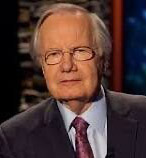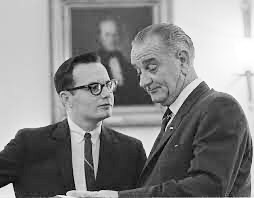50+ Years of Bill Moyers’ journalism joins Library of Congress archive

Bill Moyers (DC staff 62–64)
Legendary U.S. broadcaster Bill Moyers is set to join fellow journalist Judy Woodruff Thursday evening for a conversation and screening at the Library of Congress’ Thomas Jefferson Building in Washington, D.C. to celebrate a collection of his work spanning half a century.
“They will discuss changes in the media and journalism over more than five decades, their experience covering America and foreign affairs, the Civil Rights Movement, race, and the clash of ideologies, including challenges to democracy from capital, extremism, and growing conflicts over the freedom of democracy,” according to the Library of Congress.
Woodruff chairs the executive advisory council of the American Archive of Public Broadcasting—a collaboration between the Library of Congress and Boston’s GBH that pulled together more than 1,000 television programs for its recently unveiled Bill Moyers Collection, most of which is available online at AmericanArchive.org.
“The Bill Moyers Collection offers a wealth of engaging and probing conversations with leading thinkers, authors, artists, and political figures of our times, along with penetrating investigative reports covering many conflicts and issues that have animated the past 50 years and beyond,” said Alan Gevinson, the Library of Congress’ project director for the archive. “We are deeply honored to host this remarkable collection.”
“The Bill Moyers Collection offers a wealth of engaging and probing conversations with leading thinkers, authors, artists, and political figures of our times, along with penetrating investigative reports.”
Throughout his decades in journalism, Moyers has interviewed numerous high-profile figures, including Maya Angelou, Margaret Atwood, Harry Bridges, Bill Gates, Salman Rushdie, Desmond Tutu, Elie Wiesel, and multiple U.S. Supreme Court justices and presidents.
“To have our decades of work preserved in such a way—where anyone can come online and visit so many hours of programming—is an unexpected honor,” said Moyers, a longtime Common Dreams contributor and Television Hall of Fame member who has won multiple Emmy Awards, Alfred I. duPont-Columbia University Awards, Peabody Awards, and George Polk Awards.
“That the American Archive of Public Broadcasting is making this possible,” he added, “will allow viewers for generations to come to see what mattered to us over the years—and how we covered our times through the stories of contemporary democracy and its struggle to survive and thrive as well as the perceptions of many of our society’s foremost thinkers and creators.”
As the journalist’s website—which is in archive mode—details:
Moyers began his journalism career at age 16 as a cub reporter for his hometown daily newspaper in Marshall, Texas.

Bill Moyers with President Lyndon Johnson
He was a founding organizer and deputy director of the Peace Corps and special assistant to President Lyndon B. Johnson. Moyers served as Johnson’s press secretary from 1965 to 1967.
As publisher of Newsday from 1967 to 1970, Moyers brought aboard writers including Pete Hamill, Daniel Patrick Moynihan, and Saul Bellow, and led the paper to two Pulitzer Prizes.
In 1976, he was the senior correspondent for the distinguished documentary series “CBS Reports” and later a senior news analyst for the “CBS Evening News.”
In 1986, Moyers and Joan Konner founded Public Affairs Television—which, as the Library of Congress noted, “was widely acclaimed for its innovative and courageous exploration of subjects including politics, the environment, the role of the media in democracy, and the world of ideas.” His wife and creative partner Judith Davidson Moyers soon joined the independent production company, which operated until 2015.
“Not content just to diagnose and document corporate and political malpractice, Moyers has regularly taken his cameras and microphones to cities and towns where unions, community organizations, environmental groups, tenants rights activists, and others were waging grassroots campaigns for change,” Peter Dreier wrote for Common Dreams in 2015. “Moyers has given them a voice. He has used TV as a tool to expose political and corporate wrongdoing and to tell stories about ordinary people working together for justice.”
Near the end of the final episode of his weekly show “Moyers & Company” in 2015, the veteran broadcaster told viewers that “democracy is a public trust—a reciprocal agreement between generations to keep it in good repair and pass it along.”
“Our great progressive struggles have been waged to make sure ordinary citizens, and not just the rich and privileged, share in the benefits of a free society,” he continued. “So to this new generation, I say: Over to you, welcome to the fight.”
No comments yet.
Add your comment